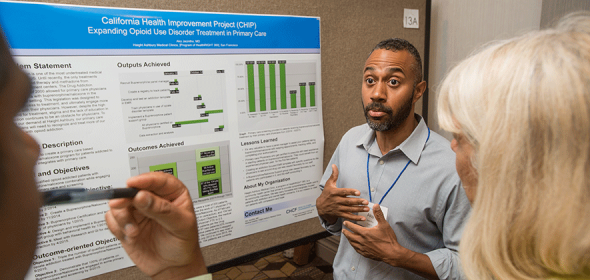California Health Care Improvement Projects (CHIPs)

California Health Care Improvement Projects (CHIPs) are designed by CHCF Health Care Leadership Program participants with the goal of addressing meaningful challenges or opportunities in health care.
Browse CHIPs to leverage the work of CHCF alumni and find opportunities to collaborate in order to improve health for Californians.
Search CHIPs
Meeting Overwhelming COVID-19 Testing Need in Marginalized Communities in Los Angeles County
Clemens HongMarginalized communities were disproportionately affected by the COVID-19 pandemic with increased cases, hospitalizations, and deaths. As the County COVID-19 testing lead, I worked to ensure equitable access to COVID-19 testing in marginalized communities across Los Angeles County. We partnered with the State, Cities and private partners to expand countywide testing capacity, used data to allocate COVID-19 community testing resources to the most marginalized and impacted communities, engaged trusted messengers to get accurate information out to these populations, and engaged our expert community-based organizations and churches to perform outreach, navigation, and testing. Through this effort we reduced disparities in COVID-19 testing access between high and low risk communities by Health People Index indicator through the course of the pandemic.
June 1, 2022View/Download PDF
Provider Accountability for Clinical Performance Metrics by Race
Kevin SmithWhile it’s clear that racism and not race has been determined the driver for racial healthcare disparities, it can be frustrating and feel merely theoretical for providers to realize impactful mitigating efforts. My plan is to provide Provider Scorecards reflecting individualized performance metrics stratified by race as a reminder of provider onus regarding health disparities and alerting them to disparities they may unintentionally perpetuate. The goal would be to create a tangible monitor for unconscious bias.
June 1, 2022View/Download PDF
Promotional Ladder for Ambulatory Care Medical Assistants at Stanford Health Care
Karen JazminI wanted to encourage professional growth, increase operational contributions, and improve staff retention for the medical assistants in ambulatory care across the organization. This project was personally important to me because 90% (525 out of 584) of the medical assistants in Stanford Health Care are women and women of color. The goal of the project was to develop a fair, realistic, and inclusive promotional ladder to incentivize medical assistants in the ambulatory care setting at Stanford Health Care.
June 1, 2022View/Download PDF
Developing a Perinatal Trauma-Informed Network of Care
Melanie ThomasAs indicated in the subtext of my CHIP title, I’m sharing a mix of project and leadership journeys. Especially in the pandemic era, it seems (at least for me), the threads of personal and professional experience are increasingly intertwined. For my CHIP, I started with the question of: How might we develop and implement a respectful, comprehensive, and trauma-informed model of care for pregnant and parenting people that better coordinates existing medical, behavioral health and social services and creates continuity across the birth divide? This project is important to me as a perinatal psychiatrist, as a mother, and as someone who identifies as having experienced depression across different phases of my own life course. By altering our approach to perinatal healthcare, we can improve individual maternal and child health outcomes, disrupt the intergenerational transmission of trauma, and move toward public health equity.
June 1, 2022View/Download PDF
Reimagining Hospital Case Management: Separating Care Transitions and Utilization Management at Sutter Health
Erin KnightThe goal of the project was to separate the RN case manager role into two separate roles of care transition case managers and utilization case managers to achieve: • Improved care transitions across the continuum • Increased medical management • Increased efficiency in workflows and joy of work
June 1, 2022View/Download PDF
Mandating Equity: Promoting Health Justice and Avoiding the Minority Tax
David TienAfter issuing statements on racial justice during Summer 2020, health care institutions’ attention towards health justice has decreased substantially. Meanwhile, health equity work is often (1) uncompensated and (2) undertaken by people from under-represented communities. This combination results in a “minority tax” on these colleagues, causing ongoing professional and psychological harm.
This project aimed to set an expectation that health equity promotion should be valued similarly to other “normal” professional goals (e.g., clinical productivity, academic involvement, and Division citizenship). During FY2020-2021, “an equity mandate” was implemented in our Division of Primary Care at an academic safety net hospital in Oakland, California. Eligible faculty had 1% of total potential compensation made contingent on specifying and meeting a health equity goal in their non-clinical work. Goals were made through shared decision-making between the Division Chief and faculty members, centering on two questions: “How might your work impact health equity?” and “How might you measure the impact of your work on health equity?”
June 1, 2022View/Download PDF
Improving Job Satisfaction and Preventing Provider Burnout by Creating an Educational Program for Improved Communication Using Dialectical Behavioral Therapy Principles
Delphine LeeAn educational program was delivered that led to improved confidence handling difficult interactions involving resident trainees (and faculty) with patient (and others). The prototype was developed and tested in 2020, feedback was incorporated and a 2nd prototype was tested in 2021. A survey of participants showed trends of improvement in communication and facilitation, increased effectiveness with implementation of new skills, and increased self-awareness.
June 1, 2022View/Download PDF